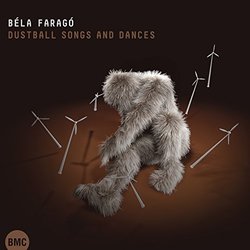| All Artists: Bela Farago Title: Dustball Songs & Dances Members Wishing: 0 Total Copies: 0 Label: Bmc Records Release Date: 8/10/2018 Genres: Opera & Classical Vocal, Classical Style: Number of Discs: 1 SwapaCD Credits: 1 |
Search - Bela Farago :: Dustball Songs & Dances
 | Bela Farago Dustball Songs & Dances Genres: Opera & Classical Vocal, Classical This CD contains a selection of works including the human voice from the period 1986-2009, almost 25 years. Farago had the basic idea for this CD two years ago when he was 55, and noticed what an important role the voice h... more » |
Larger Image |
CD Details
Synopsis
Product Description
This CD contains a selection of works including the human voice from the period 1986-2009, almost 25 years. Farago had the basic idea for this CD two years ago when he was 55, and noticed what an important role the voice had played in his life, right from the first pieces composed at the age of eight. Some of the 'solutions' on this CD were not decided in advance, but were the intuitive products of a long, intensive process of searching. The exciting thing was whether these budding ideas, that he has had from the beginning of his musical career, would find their own place - not for their own sake, but in a more complex musical existence than in the composing of a song cycle or an opera. ''Dustball Songs And Dances'' is a suite of choral movements, based on Franz Kafka's Metamorphosis. The trials of salesman-turned-insect Gregor Samsa, his protracted farewell and demise, are observed to the end from the cracks in the floorboards by 'invented' beings, Dustballs. They are his only companions as he discovers his new abilities, and it is they who console the protagonist when he needs it. When necessary, they comment on the story, they portray our feelings, and are witnesses to the final moments of his passing. ''Songs for Attila József's Poems'' is a cycle of songs for mezzosoprano, violin, and piano, composed in 1996. During composition Farago's goal was to give the poems the simplest possible musical expression, but for them to be as concentrated, and as expressive as possible. The first version of ''Has It Not Become Colder?'' was made in 1985, as part of a Friedrich Nietzsche performance. One year later, during his tabla studies, the piece gained new dimensions, and a more complex form. With composer and sitarist László Hortobágyi, they expanded the original music with material written for these two typically Indian instruments, thus necessitating a far more complex formal structure for the work. The final version developed into a formally 'regular' raga.
